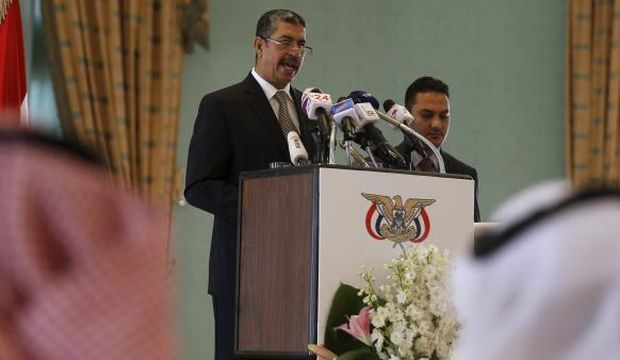
Yemen’s Prime Minister and Vice President Khaled Bahah addresses a news conference in Riyadh, Saudi Arabia, on June 8, 2015. (Reuters/Faisal Al Nasser)
Riyadh and Washington DC, Asharq Al-Awsat—Meetings in Geneva between Yemen’s internationally recognized government and the Houthi movement currently in control of large parts of the country will comprise “consultations not negotiations,” Prime Minister and Vice President Khaled Bahah said on Monday.
Speaking during a news conference in Riyadh, Bahah said there would be no “conditions” of any kind made during the meetings, which would simply put into practice the outcomes of previous political negotiations on the country’s future as well as the UN Security Council resolution on Yemen adopted in April.
Resolution 2216 stipulates the Houthis withdraw from all areas in Yemen currently under their control and cease all hostile action in the country. The government has set the Houthis complying with the outcomes of the resolution as a precondition for attending the Geneva meetings.
While not offering ironclad guarantees, UN Special Envoy on Yemen Ismail Ould Cheikh Ahmed last week told Yemen’s internationally recognized President Abd Rabbuh Mansur Hadi the Houthi leadership had promised it would abide by the resolution. Ould Cheikh Ahmed had met with a Houthi delegation in Sana’a just days before meeting Hadi.
Speaking to Asharq Al-Awsat on Monday, Yemen’s Permanent Representative to the UN Khaled Alyemany said that the organization was in agreement that the meetings, scheduled to begin on June 14, would only comprise “consultations and not negotiations” with the Houthi movement.
A press release from UN Secretary-General Ban Ki-moon on Saturday referred to the meetings as “consultations” and stressed he hoped they would “restart a peaceful, orderly, inclusive and Yemeni-led transition process” based on Resolution 2216 and previous resolutions adopted by the Security Council on Yemen.
During the news conference in Riyadh, Bahah also said the Geneva meetings would discuss a possible humanitarian ceasefire to begin during the Muslim holy month of Ramadan, which starts on June 17.
He added however this was contingent upon the Houthis withdrawing from areas in the country currently under their control.
The current crisis in Yemen began when the Houthis’ militias occupied the capital Sana’a in September of 2014, also spreading throughout other areas in the country. The group then staged a coup in February putting President Hadi, Premier Bahah, and other members of the cabinet under house arrest.
The recent Saudi-led air campaign targeting the Houthis in Yemen began on March 26. This came following a request for military intervention by Hadi to Riyadh and its Arab partners, after he fled his house arrest and headed to the Saudi capital.
Saudi Arabia, its Arab allies, and the international community have accused Iran and former Yemeni president Ali Abdullah Saleh—who was ousted in 2012 following mass protests against his more than three decade rule—of supporting the Houthis and seeking to destabilize Yemen.
Nasser Al-Haqbani and Heba Qudsi contributed reporting from Riyadh and Washington DC.
